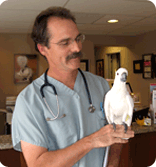Sick blue fronted Amazon parrot in Brazil

My 3 yr old female amazon parrot (Amazona aestiva) is presenting health problem and in the Brazilian town where I live there is no an specialist avian vet. From three weeks ago it started with watery green drops and was not eating well and changed its behavior becoming quiet and not vocalizing almost all the time. I brought it for a (not avian) vet and he noted it has fever and ventricular atony. He prescribed an antiemetic (metoclopramide cloridate 5mg/mL - 3 drops twice during 3 days) and antibiotic (oxitetracyclin cloridrate 810mg/100mL - 5 drops twice for 7 days). The parrot does not get better and I return yesterday to the vet and he prescribed again the same antiemetic and a vermifuge (mebendazol 5g/100mL - 10 drops diluted in 100mL of its drinking water). Now its drops are still watery and now yellowish (I have a picture if you need). Do you have any suggestion? Do I keep the prescribed treatment?

Luciano, these clinical signs are alarming, and I hope your bird has improved in its condition. It is virtually impossible for me to advise you accurately on the treatment of your birds considion, in the absence of a clear diagnosis. In general, yellow tinged urates and urine is indicative of liver-associated problems, and there are a handful of bacterial and viral diseases that must be considered. Of these, the disease Psittacosis is potentially contagious from your bird to you. Should this be Psittacosis, you may want to ask your doctor about the possibility of treatment with the antibiotic Doxycycline, as this drug is the treatment of choice for this disease internationally. Birds really do not have fevers - but rather, their normal body temperatures are quite high normally. Atonic conditions of the gizzard are uncommon in parrots, overall. My suspicions would be that there is most likely an infectious condition here, that you would be best to press your doctor to considering diagnosing or treating differently. Often, these birds will require hospitalization, tube feeding, injectable fluids and other supportive care in addition to treatment for their primary disorder. Wishing you and your poor bird the best,

































